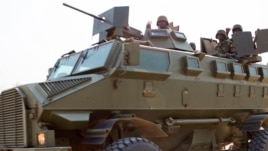Speakers at a Nairobi forum sponsored by the Rift Valley Institute expressed concern for the future of South Sudan following a ceasefire agreement brokered in Addis Ababa late last week. Participants also raised issues concerning the presence of Ugandan forces in the conflict.
 The negotiations were held by the Intergovernmental Authority on Development (IGAD), the regional body that was drawn into the brutal conflict following reports that Ugandan troops were battling alongside government forces loyal to President Silva Kiir.
The negotiations were held by the Intergovernmental Authority on Development (IGAD), the regional body that was drawn into the brutal conflict following reports that Ugandan troops were battling alongside government forces loyal to President Silva Kiir.
Rev. James Ninrew of the Presbyterian Church of Sudan questions the neutrality of the peace process, if Uganda – a key member of the IGAD – takes sides in the conflict.
"As civil society organizations, we condemn negative intervention into the South Sudanese affairs because that is inviting further crisis rather than solving the problem," says Rev. Ninrew.
"So for that, we are not for it. We are even questioning the role of Uganda or any other country from East Africa that is taking sides and also wants to sit at the table to mediate people.
"Is IGAD the only body that can do that? If IGAD continues doing that, getting involved in the war and at the same time sitting at the table, I think the voice of the South Sudanese will say no.”
…
Jok Madut Jok, co-founder of Sudd Institute, an independent research organization based in South Sudan, says the issues and the solution are complex. Jok said the parties need to "build into that final agreement a lot of mechanisms that will ensure crafting the country together …
"You need to give room to justice and accountability for acts of violence committed during this war. You need to address the injuries inflicted upon various ethnic communities so that as to repair the ethnic relations….
"That way people will invest in the idea that they are citizens of the nation not citizens of their communities. You need to build on the constitution so that the people’s voices and aspirations can be represented through it."
The world's newest nation may be fallign apart, cautioned Ms. Apuk Mayen, a South Sudanese diplomat working to increase women’s participation in formal peace processes.
"We are almost repeating the same mistakes that other African countries have made," she said. "I think we have failed because we fail to recognize that our tribes are actually political organizations. They have their own super structures.
"We have elements within our culture to govern ourselves, to mobilize ourselves to war. We are seeing this in some of the things happening."
If you feel threatened, she said, "you have mechanisms on how to protect and defend yourself.
"Unfortunately, in this construct of a state, it doesn’t work because we haven’t reconciled the state to this existing political organization that we have. I feel there are real questions that we need to ask ourselves.” ….



